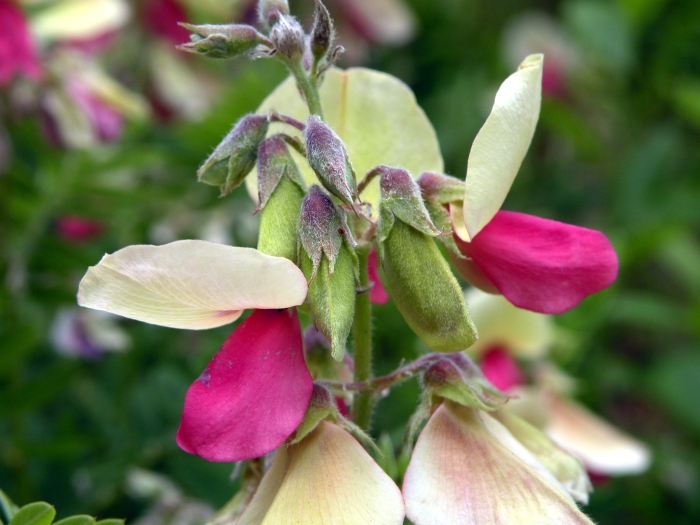Goat’s Rue
(Tephrosia virginiana)
Goat’s Rue (Tephrosia virginiana)
/
/

Doug McGrady
CC BY 2.0
Image By:
Doug McGrady
Recorded By:
Copyright:
CC BY 2.0
Copyright Notice:
Photo by: Doug McGrady | License Type: CC BY 2.0 | License URL: https://creativecommons.org/licenses/by/2.0/ | Uploader: Doug_McGrady | Publisher: Flickr |























































Estimated Native Range
Summary
Tephrosia virginiana, commonly known as Goat’s Rue, is a perennial herb native to open woodlands, prairies, and fields in the Eastern and Southern United States. It typically grows to a height of 1-3 feet (0.3-0.9 meters) and a similar width. The plant has a distinctive appearance with alternate compound leaves that are imparipinnate, featuring relatively wide pinnae. The foliage and stems are covered in fine hairs, giving the plant a silvery, hoary appearance. Goat’s Rue produces terminal, compact racemes of cream and deep pink flowers that are quite showy, blooming from May to August, and are attractive to pollinators such as bees and butterflies.
Goat’s Rue is valued for its ornamental flowers and its ability to thrive in poor, acidic soils, making it a suitable choice for naturalized areas, wildflower gardens, and restoration projects. It is also used in border plantings and as a ground cover. This plant is drought-tolerant once established and requires low to medium amounts of water. It prefers full sun to partial shade and is adaptable to a range of soil drainage conditions. While generally low-maintenance, it can be susceptible to root rot in overly wet conditions. Goat’s Rue is not known for aggressive roots or significant disease problems, but it can be toxic to livestock if ingested in large quantities.CC BY-SA 4.0
Goat’s Rue is valued for its ornamental flowers and its ability to thrive in poor, acidic soils, making it a suitable choice for naturalized areas, wildflower gardens, and restoration projects. It is also used in border plantings and as a ground cover. This plant is drought-tolerant once established and requires low to medium amounts of water. It prefers full sun to partial shade and is adaptable to a range of soil drainage conditions. While generally low-maintenance, it can be susceptible to root rot in overly wet conditions. Goat’s Rue is not known for aggressive roots or significant disease problems, but it can be toxic to livestock if ingested in large quantities.CC BY-SA 4.0
Plant Description
- Plant Type: Herb, Subshrub
- Height: 1-2 feet
- Width: 0.8-1.5 feet
- Growth Rate: Moderate
- Flower Color: Cream, White, Pink
- Flowering Season: Spring, Summer
- Leaf Retention: Deciduous
Growth Requirements
- Sun: Full Sun
- Water: Medium
- Drainage: Slow, Medium, Fast
Common Uses
Bee Garden, Bird Garden, Border Plant, Butterfly Garden, Deer Resistant, Drought Tolerant, Low Maintenance, Rock Garden, Salt Tolerant, Showy Flowers
Natural Habitat
Native to open woodlands, prairies, and fields in the Eastern and Southern United States
Other Names
Common Names: Catgut, Goat’s-Rue, Rabbit-Pea, Virginia Goat’s-Rue, Cat-Gut, Téphrosia De Virginie, Téphrosie De Virginie, Flaggärt
Scientific Names: , Tephrosia virginiana, Tephrosia virginiana var. holosericea, Tephrosia virginica, Cracca virginiana, Cracca latidens, Galega virginiana, Tephrosia virginiana var. glabra, Cracca leucosericea, Tephrosia virginiana var. virginiana
GBIF Accepted Name: Tephrosia virginiana (L.) Pers.